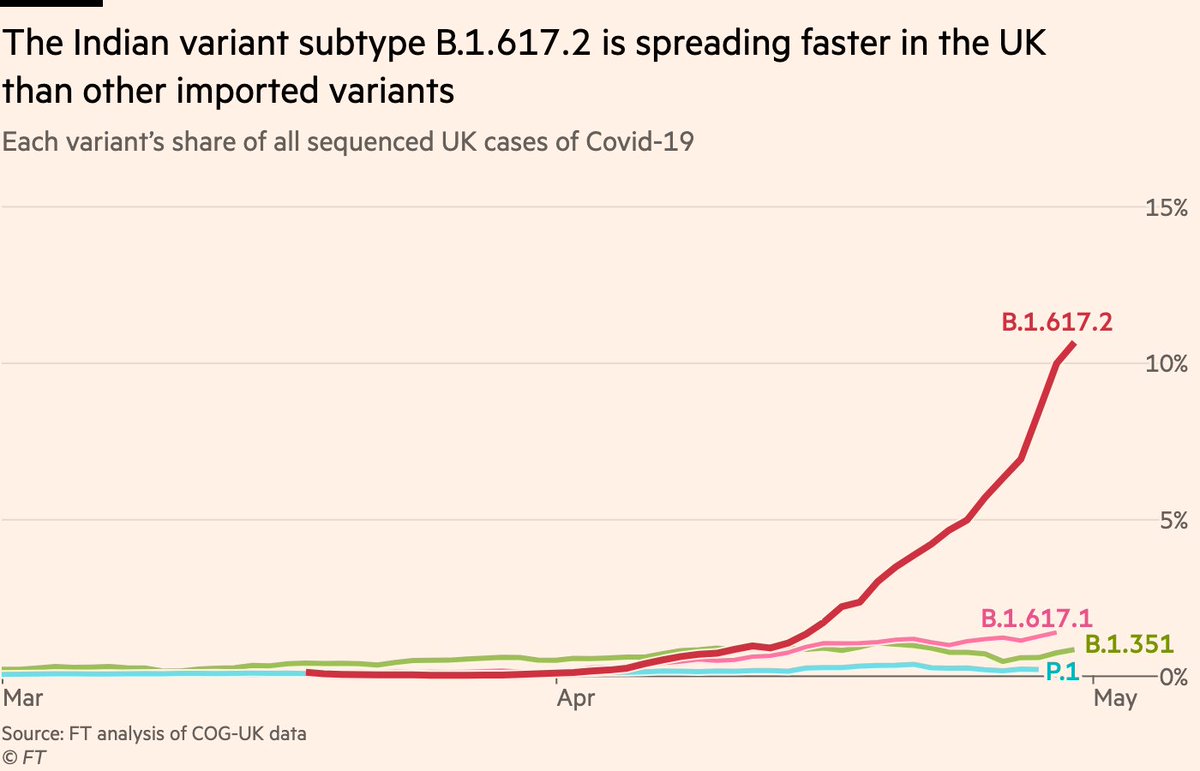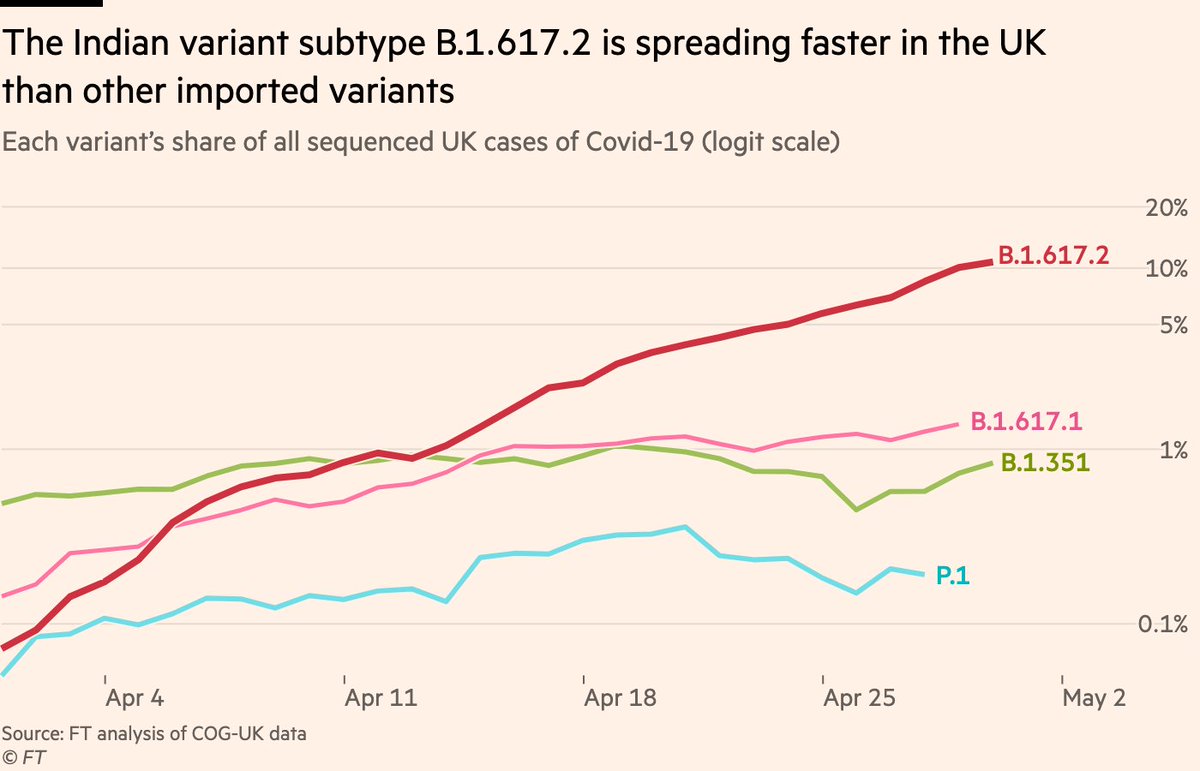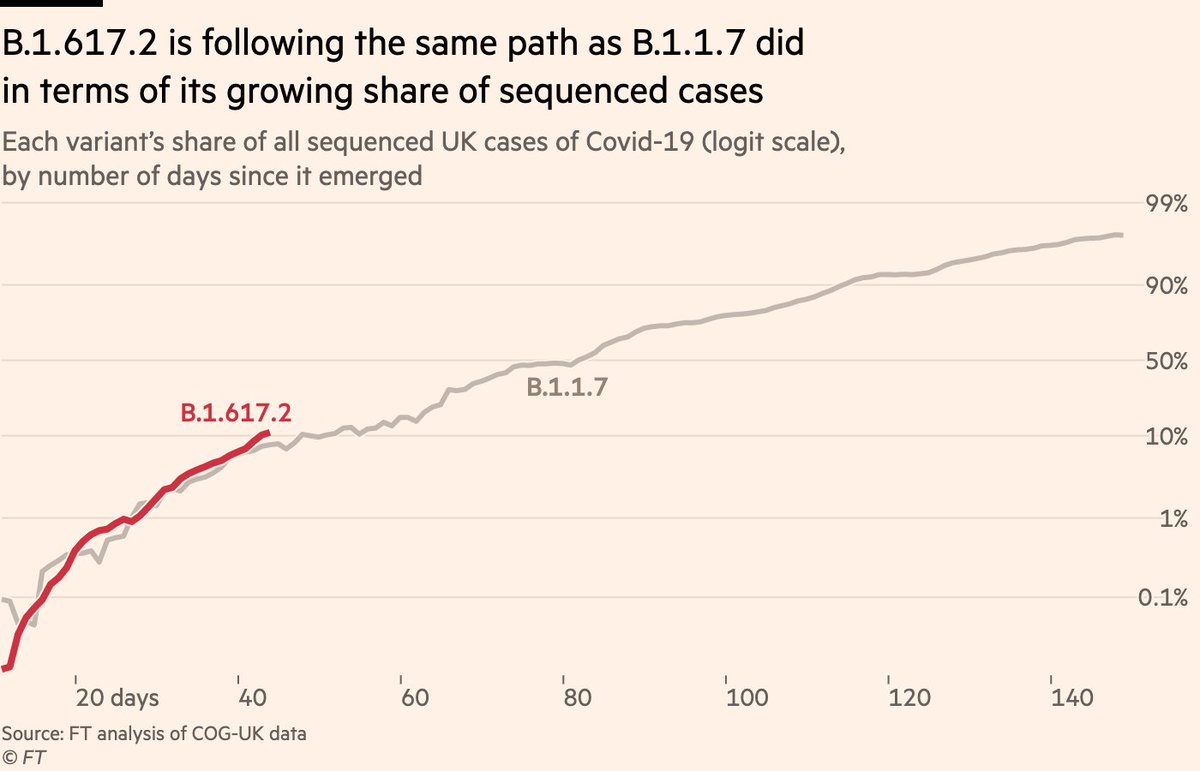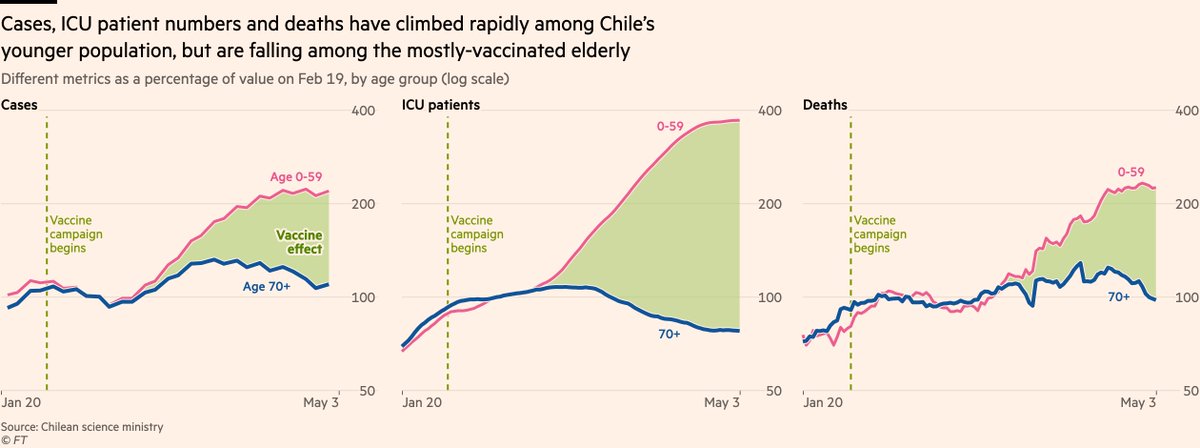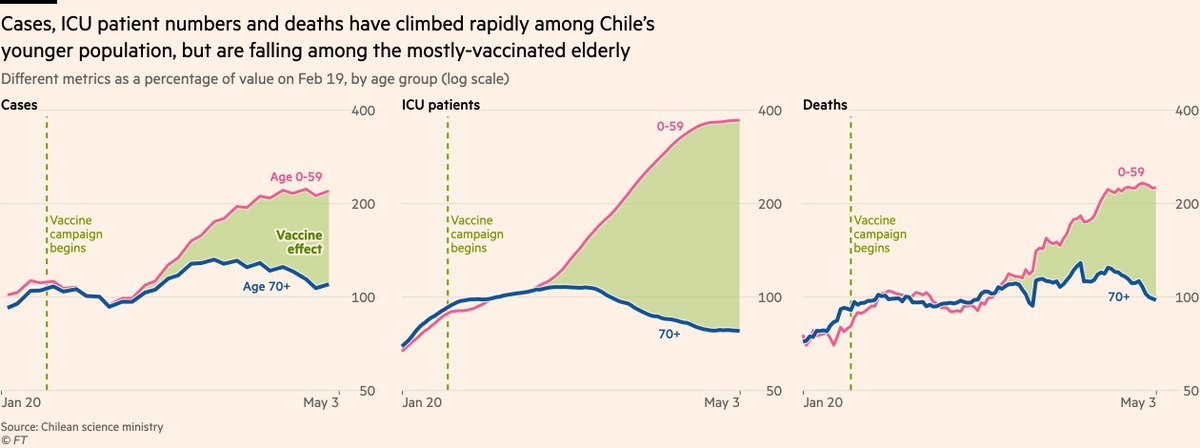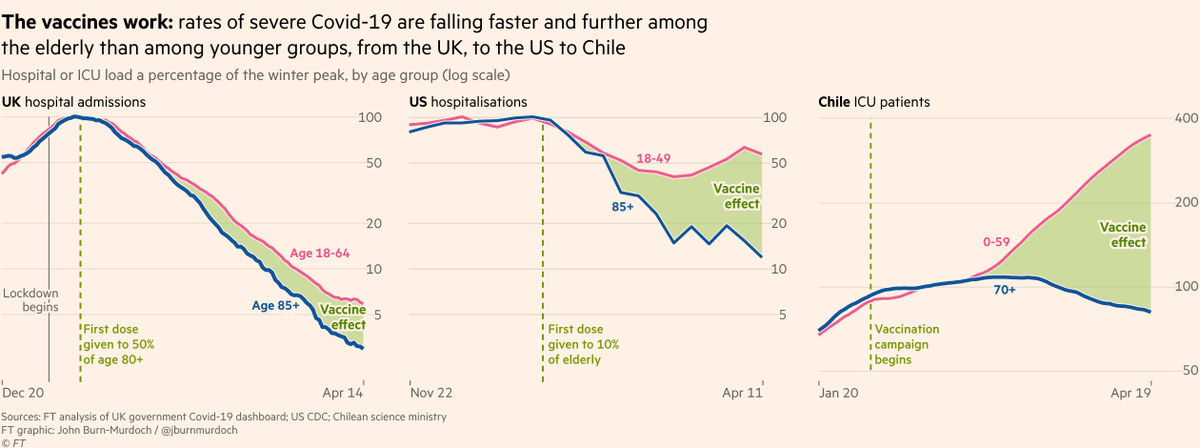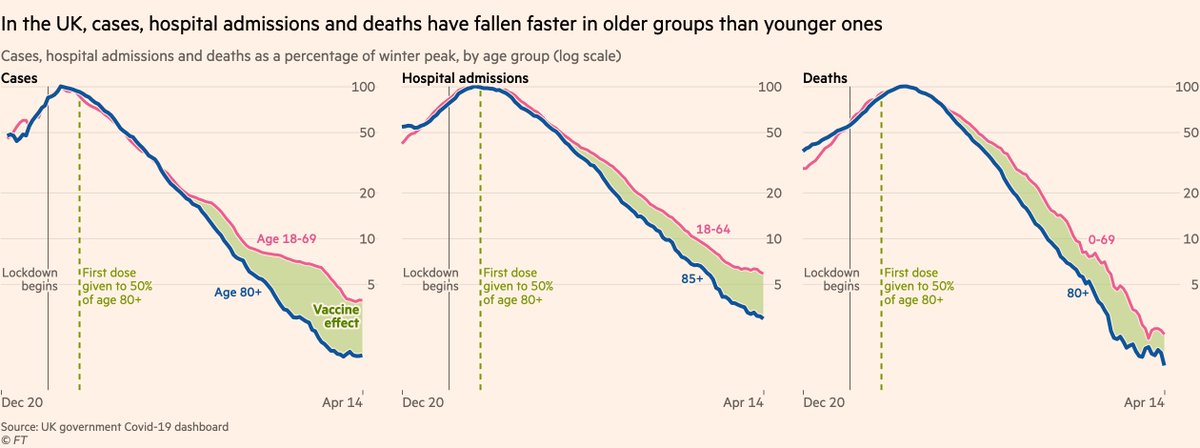
NEW: is the Indian variant B.1.617.2 escaping the vaccines? @AnnaSophieGross, @AmyKazmin, @jyots43 and I investigate
Story here: ft.com/content/5f7427…
And now time for a thread where I complain about persistent misreporting of breakthrough infections and vaccine escape:
Story here: ft.com/content/5f7427…
And now time for a thread where I complain about persistent misreporting of breakthrough infections and vaccine escape:
First, the fact that a small portion of fully vaccinated people can still get infected is not news. That a tiny portion of fully vaccinated people *die* of Covid is not news.
Vaccines greatly reduce your risk of infection, transmission, illness & death. They do not eliminate it.
Vaccines greatly reduce your risk of infection, transmission, illness & death. They do not eliminate it.
This is why it’s been so frustrating seeing tweets go viral for screenshotting vaccine trial results with "deaths: 0" in them.
In a trial of hundreds or a couple of thousand people, you may get zero deaths. In the real world (315m people now fully vaccinated) you don’t.
In a trial of hundreds or a couple of thousand people, you may get zero deaths. In the real world (315m people now fully vaccinated) you don’t.
We knew all of that already. Not one vaccine was ever found to be 100% effective at preventing infection, severe disease or death.
The vaccines are still amazing! A @PHE_uk study this week showed 97% protection against death among the elderly khub.net/documents/1359…
The vaccines are still amazing! A @PHE_uk study this week showed 97% protection against death among the elderly khub.net/documents/1359…

But we’re now in a situation where every breakthrough infection is suddenly a 🚨🚨 headline 🚨🚨, even when the vaccines prevent those infections becoming severe.
And every death of a vaccinated person is reported as if it somehow shatters everything we knew. It doesn’t.
And every death of a vaccinated person is reported as if it somehow shatters everything we knew. It doesn’t.
We’ve seen breathless reports of an outbreak of the Indian variant in a UK care home, infecting 15 elderly residents who had been fully vaccinated.
Those numbers would typically result in 5 or 6 deaths. This time? Zero
Those numbers would typically result in 5 or 6 deaths. This time? Zero
https://twitter.com/DevanSinha/status/1390388896433942544
And that’s not random luck; it’s how the vaccines work. A particularly nasty variant might evade the barriers against infection, but the second line of defences — against disease and death — is much stronger. We’ve known this all along.
As ever, @nataliexdean has a fantastic diagram illustrating this point. Lab studies will often show reduced levels of vaccine-induced antibodies, but they don’t come close to the magnitude of reduction required to evade protection from severe disease
https://twitter.com/nataliexdean/status/1392149207343976453
So time after time, we see the same thing.
Real-world data found the South African variant (thought to have similar levels of immune escape to B.1.617) produced a small drop in protection against infection, but no reduction in protection against disease nejm.org/doi/10.1056/NE…
Real-world data found the South African variant (thought to have similar levels of immune escape to B.1.617) produced a small drop in protection against infection, but no reduction in protection against disease nejm.org/doi/10.1056/NE…
In India B.1.617.2 is dominant, but report after report finds the vast majority of breakthrough infections do not go on to require medical attention
A small number do, but that’s what we’d expect where *millions* have been infected and millions vaccinated
A small number do, but that’s what we’d expect where *millions* have been infected and millions vaccinated
https://twitter.com/VincentRK/status/1391869808858238979
And as tens and hundreds of millions more people get vaccinated, we’ll continue to get reports of breakthrough cases & clusters, and occasional breakthrough deaths.
Just remember, these are the exceptions that prove the rule, and the rule is: vaccines provide enormous protection
Just remember, these are the exceptions that prove the rule, and the rule is: vaccines provide enormous protection
All of this is to say:
• I know people are more attracted to negative than positive news
• But it’s critical that we don’t allow ourselves to slide, constantly finding the next risk to worry about, even as we make huge progress, and the risks become fewer and less risky
• I know people are more attracted to negative than positive news
• But it’s critical that we don’t allow ourselves to slide, constantly finding the next risk to worry about, even as we make huge progress, and the risks become fewer and less risky
A year ago, we were in the midst of a pandemic with nothing to protect the vulnerable except staying away from one another, and if an older or vulnerable person got infected, there was a serious risk they could become severely ill or die.
Vaccines have changed the game. Vaccinated people are protected as they mix with others, and if they get infected there is much, much less risk of them becoming severely ill or dying.
To the best of our knowledge, this is as true for B.1.617.2 as it has been for other variants.
To the best of our knowledge, this is as true for B.1.617.2 as it has been for other variants.
Unfortunately some vaccinated people will still lose their lives (so don’t despair that we’re back to square one if you hear reports of this), but the vast majority won’t.
Of course, unvaccinated people do remain vulnerable, whether to B.1.617.2, or B.1.1.7 or any variant, so it remains critically important that we vaccinate as many people as possible, as quickly as possible.
But please don’t fall into the trap of thinking that stories of breakthrough infections herald a return to March or December 2020. We didn’t have vaccines then, but we do have them now, and they work (including against the new variants).
And a final piece of advice:
A single study of real-world vaccine efficacy is worth 10 lab studies of neutralising antibodies
A single study of real-world vaccine efficacy is worth 10 lab studies of neutralising antibodies
https://twitter.com/zeynep/status/1392137906362503171
• • •
Missing some Tweet in this thread? You can try to
force a refresh




